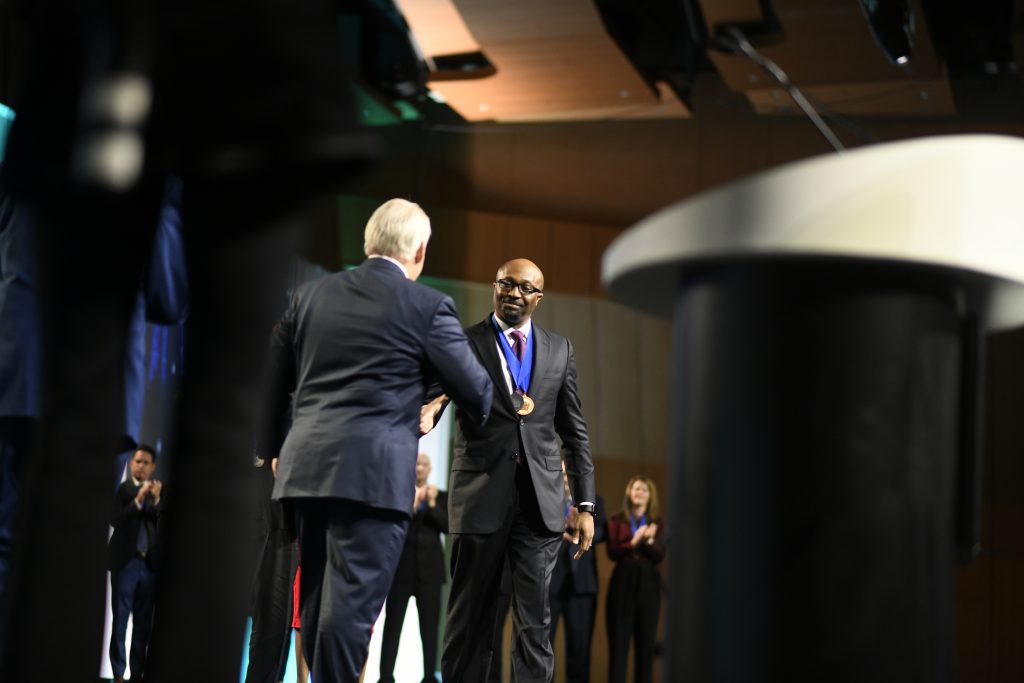As superintendent of the Wenztville School District in suburban St. Louis, Mo., Curtis A. Cain covers a lot of ground. Not just the physical territory – the district’s 18 buildings over 90 square miles – but also the ideological terrain that has put so many superintendents to a stress test of late.
Cain has managed to keep the focus on students and learning when he visits classrooms, as when he spent time recently in the 1st-grade classroom of teacher Katherine Zak, something he’s done more than once. “He goes on the floor or pulls up a chair to listen to a child read an essay,” Zak says. “He’s very student-centered.”
Cain, 48, with a nine-year tenure atop the 17,350-student district, maneuvers just as comfortably when the governing board in his mostly conservative community does not buy into his professional recommendations. The school board refrained from considering the superintendent’s request for a mask mandate in January during the resurgence of the coronavirus by not even voting on the measure.
“There's an old saying that schools reflect society. The challenges that districts are experiencing are not isolated to schools, they are everywhere,” Cain says. “The key is to lean into the disagreements but not become disagreeable. We may be done with the pandemic, that does not mean it's done with us. Keeping calm, actively listening and keeping students at the center of our decisions will be critical for all of us as we continue to move forward.”

That unwavering focus on students in contentious times probably explains why Cain was named the 2022 National Superintendent of the Year during AASA’s national conference. The announcement was made at the 1st General Session on Thursday. Cain is the reigning Missouri Superintendent of the Year and the current president of the Missouri Association of School Administrators.
He’s also about to seek a new professional adventure, having been named the next superintendent this summer of the Rockwood School District, the largest school district in the St. Louis suburbs.
Cain has deftly led Wentzville, the fastest-growing district in Missouri, since 2013 by overseeing the passage of three of four ballot initiatives, totaling $280 million. The district has grown threefold since 2000 when it enrolled 6,000 students.
“Two years ago, we opened an elementary school, this year a high school and next year a middle school,” says Cain. “We keep projects on time and under budget,” quick to credit those he works with. “It’s greater than any one individual.”
Cain brought in a demographer to study the district’s rapid gains and related needs to explain to the community why expansion was needed. “He has navigated [that] with such humility and grace,” says Wentzville’s school board president, Betsy Bates.
Those qualities have been called upon regularly throughout the pandemic.
“We are a very conservative community,” says Edgar Nelson, principal of Liberty High School. “Right on the heels of COVID, we’ve been dealing with [critical race theory]. Dr. Cain is really so unflappable even when people are screaming and yelling.”
In late January, on a 4-3 vote, the Wentzville board officially removed The Bluest Eye by Toni Morrison, a Nobel Price-winning author, from its high school libraries. Outrage from librarians widely followed.
Cain soldiers on. “We’re role models for our kids,” he says. “There needs to be context and situational awareness. Keep a steady hand when things are heated and model professionalism and dignity. … [F]ind a way to cool the waters.”
He has tried to address issues of underrepresentation of minority students through examining how they are identified for gifted programs, including one that focuses particularly on STEM.
“We’re opening the door to as many opportunities and experiences as possible [to address] historic inequities,” says Cain. Whether it’s partnering with Girls Who Code or expanding the kind of Legos younger students have in their classrooms, “we have to be purposeful about opening more doors to all students.”
His colleagues in administration say the superintendent has shifted the paradigm in Wentzville. John Schulte, assistant superintendent of administrative services, says, “Like most school systems, there’s a population of students who may be struggling with substance abuse. Dr. Cain has allowed us to have a substance abuse intervention program in school and discontinue the practice of suspending students and sending them out of school. …We give students the option to partner with us and local agencies [to stay in school.]”
Cain also has his eye on ways to expand the pool of potential teachers. Through the Grow Your Own Program, the district targets instructional support staff who might be interested in moving up to professional teaching positions.
“They build relationships with our students, understand our curricular scope and pace, observe and support instruction, and assist students with great frequency,” says Cain, whose career started as a teacher at Dollarway Junior High School in Pine Bluff, Ark. “Consequently, we absolutely believe that they have the potential to become full-time teachers in the Wentzville School District.”
The product of public schools in Milwaukee, Wis., Cain counts plenty of family influence for entering the education field. His mother was a consumer sciences teacher and several aunts and uncles were educators. “It was ever-present. It’s a calling,” he says.
(Merri Rosenberg is a freelance education writer in Ardsley, N.Y.)

